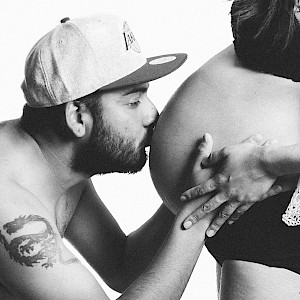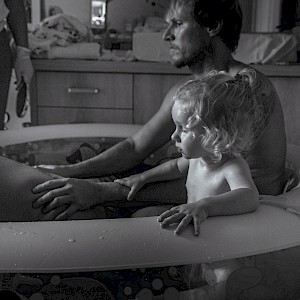What is considered a birth trauma?
Giving birth can be traumatic for different reasons and they don’t always have to be obvious. Birth trauma is any kind of physical or emotional distress you may experience during or after childbirth. A birth trauma is mainly caused by the difference between your expectation of labour and birth and what happened in reality. Birth trauma can occur if you feel unsupported, helpless, unheard, or anxious during labour. It also can occur after birth when you feel shocked, numb, and still processing the birth experience. This can lead further to post-traumatic stress disorder or any form of depression or anxiety. Therefore, a birth trauma must be identified and taken seriously.
Risk factors for a birth trauma
Did you know, that approximately 1 in 3 people who give birth experience a birth trauma? There are many factors that are crucial and so many of them can contribute to birth trauma. There are risk factors during labour and birth, but also prior to labour and they include:
- experiencing emotional distress or fear that you or your baby are going to die
- being left in pain for long periods
- experiencing physical stress or not receiving enough pain relief if asked for
- needing medical intervention without proper information or even informed consent
- being unprepared for birth sensations, emotions, and interventions
- feeling disrespected, unheard, and out of control
- not knowing your birth rights and not having done any kind of birth preparation
- previous sexual abuse
- mental health concerns
- previous still birth, birth trauma or difficult pregnancy
- pre-existing birth injuries
What exactly is defined as ‘birth trauma’?
‘Birth trauma’ is a phrase for post-traumatic stress disorder after birth. It is also used though for women and men who have symptoms of PTSD, but don’t tick all the boxes for a full diagnosis. PTSD is a disorder that can happen after experiencing or witnessing any traumatic event, which is why even birth partners, and midwives can experience PTSD after being part of a traumatic birth.
The birth trauma aftermath
Labour or birth can be traumatic for a number of reasons but in most cases, it is related to the fear that the baby is going to die. It could be that your baby’s heartrate dropped suddenly, and you were in need of an assisted or cesarean birth, or you were left in pain for hours feeling unsupported and unheard. It could be that you weren’t able to breathe properly or regularly during the birthing phase of labour or that your baby was born ill or premature and needed to spend time in special care afterwards. Perhaps you felt the staff didn’t look after you during birth or didn’t listen and you felt anxious and out of control. Birth trauma can have huge effects on your daily life even after birth: around 4-5% of women who give birth develop post-traumatic stress disorder (PTSD) and experience flashbacks, nightmares and extreme anxiety which can make the daily life challenging, especially with a newborn. 4-5% of women – this number doesn’t seem much, but it covers roughly 30.000 women each year in the UK alone. Many, many more women have “only” some birth trauma symptoms, but not enough for the PTSD diagnosis. Even more women don’t even seek medical/mental support after experiencing a traumatic birth. The term ‘birth trauma’ covers everyone who feels that a traumatic birth continues to affect them. That means, that also fathers and other birth partner can develop PTSD caused by a traumatic birth they witnessed.
How can birth trauma be prevented?
Well, it’s not a concrete science to be honest, because there are lots of variables during labour and birth and we cannot foresee all of them. Due to birth preparation and informed decision making, we can stack the odds in our favour for a positive birth though. No matter what challenge you are facing, preparation is always half the battle. If you are going for a job interview, for example, you wouldn’t go in unprepared either unless you didn’t really want the job or don’t care. If you want to compete in a marathon it would also be silly not to prepare yourself mentally and physically. Somehow we prepare naturally for big events in our life, but not for birth somehow. Why is that? Birth isn’t any different than other big things in life. In fact, it is THE big thing in life! If you learn about childbirth and labour in antenatal or hypnobirthing classes or even podcasts for example, you know what to expect and what your options are. What your body is capable of and what actually happens during labour and childbirth. It helps you to develop realistic expectations and prepare your mind for unexpected turns during your birth journey. There is no right way to give birth and even a cesarean or assisted birth in a hospital can be as beautiful and positive as a water birth at home for example. No one can predict how labour or birth will go and some things are just out of our control. Hypnobirthing classes or any kind of knowledge about your own body, the birth journey, birth environments, rights and proper birth relaxation techniques etc. will help you to keep an open mind and get yourself ready for the big day. They will also help you to ask the right questions, if labour takes an unexpected turn, so you can truly make an informed decision for yourself and your baby. Hypnobirthing classes will empower you to stay calm and without fear during birth and they will also benefit your birth partner. Knowledge is key ladies, and as always: if you don’t know your options, you don’t have any. I also advise you to establish a support network: surround yourself with people who are willing to support you and your choices. I am not just talking about family members or friends – there are also lots of supportive parent groups, independent midwives, birth educators, doulas and many more. Although you make your own choices, I advise you to be guided by your midwife or doctor, as their focus is to keep you and baby safe. BUT also feel free to ask about risks and benefits, for alternatives or more information of any kind of procedure or intervention.
Side note: What is an intervention exactly? An intervention is ANYTHING that interrupts the NATURAL birth process.
And finally: Seek mental health support if you are concerned about your emotional wellbeing. That doesn’t only count for you during pregnancy of course.
So, let me recap a few bullet points for you on how to prevent a birth trauma:
- Prepare for birth!
It is essential to have knowledge about birth, your body, baby, any procedures, and so-called routine treatments. - Know your options about birth environments, choices, birth support, birth rights etc.
- Be guided by your midwife and doctor: decisions should be a process of shared decision making between you, your doctor/midwife, and your birth partner perhaps. Collect all relevant information before you give your informed consent for any intervention.
- Keep an open mind & have realistic expectations.
- Seek mental health support if you feel unstable in any way!
Recover from a birth trauma
Now, the recovery from something traumatic can be a long and very exhausting journey. It can be difficult, especially without a support network and without seeking help. If you have experienced a birth trauma, it could help to take small steps at first: talking to your partner or to a close friend or family member can help immediately. Once you’ve relieved yourself of whatever is on your chest, it somehow frees you little by little. Saying things out loud is the first step. Thoughts can torture us especially because we feel very alone having them. Speaking about it helps and will lift a bit of weight off your shoulders. Furthermore, you can seek help in supportive groups or with your midwife, health visitor or GP and they can then refer you to a specialist if needed. The earlier the better. If you wish to have another baby in future, dealing with your traumatic experience beforehand can help to prepare better for your next birth journey.
Attending a hypnobirthing course when you are pregnant (again) can not only give you a deep understanding about your body, labour and birth. I am not saying that hypnobirthing will guarantee a pain-free birth, because it won’t, but it will provide you with tools to use during labour in order to be able to have a positive and calm birth. Birth preparation is everything – it can help you to overcome fears and any distressing views of labour and birth. By attending a hypnobirthing course, you furthermore might meet other parents who are going through the same or facing similar challenges.
Final words
Birth is meant to be beautiful. It’s meant to be wonderful and empowering. Unfortunately, if you have experienced a birth trauma, you are not alone. Medicalizing birth, the lack of communication in pregnancy care and not knowing anything about birth beforehand increases the risk of traumatic birth experiences. As much as we love modern medicine as it saves lives daily, it also keeps us from listing to our primal instincts when it comes to birth. The trust that we have in modern medicine also keep us from questioning any treatments or procedure because we assume there is a good reason for everything. What is a routine procedure for hospital staff, is a very big deal for the one that’s receiving it. Medical professionals don’t think at times there is a need for an explanation in detail and we can be left uninformed and scared, not feeling confident enough to ask anything. The lack of communication, information and explanations from medical professionals can lead to a lot of stress for patients. Proper birth preparation can also help you to be properly informed and can give you great confidence and can reduce stress or worry. We fear the unknown the most. We fear that birth could be unsafe and that our life or the baby’s life could be in danger, that we can’t cope with labour, that we do it wrong or that we feel stranded with whatever treatment we might be going through if things take an unexpected turn etc. Unfortunately, all these thoughts and views are built up in our subconscious mind as birth is always associated with something scary, painful, and dangerous (I mean why else would labour and birth always be staged as an emergency case in any TV show or movie??). We have the chance though to combat them by learning how to overwrite them and how to relax on demand under any circumstances. Even after birth it is worth learning some relaxation techniques and to practice them daily, especially if you are struggling with any symptoms after a birth trauma.
You can also contact The Birth Trauma Association about your birth trauma and find information about PTSD, including support for fathers and partners. Feeling unsupported and unable to forget your traumatic childbirth experience can be mentally challenging. The guilt that come with it can be a terrible burden to carry. Women affected often feel lonely and responsible for not being able to bond with their baby or for not being happier, although they have a healthy baby.
Birth matters. Maternal outcome matters. And it certainly should be worked on more, stacking the odds in our favor to have a positive birth experience beforehand. Hypnobirthing is just one of the birth preparations that can do that.
Reach out – we are here to help.











